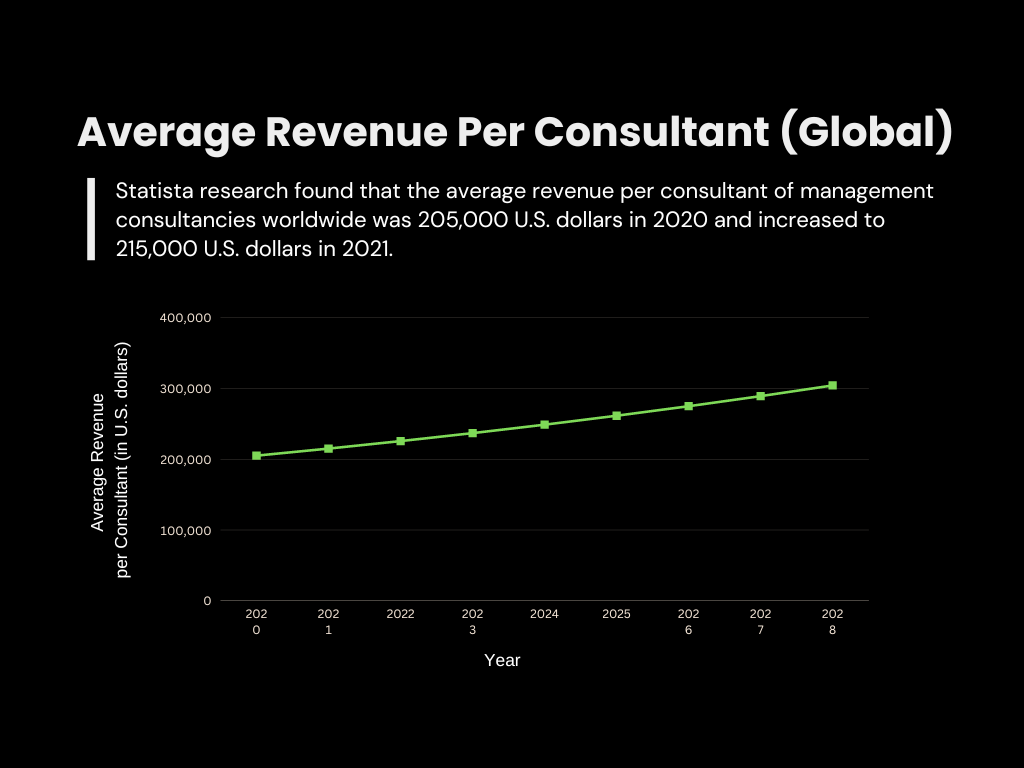
Learn how partnering with a business consultant can transform your company’s future
If you are a business owner or manager, you may have wondered whether working with a business consultant should be on your radar.
You may think: You can handle everything on your own. Or perhaps that it would be too expensive to hire a business consultant.
However, you may have your moment of epiphany after you are done reading this piece.
A business consultant is a professional who provides expert advice and guidance to help businesses improve their performance. Business consultants solve problems or achieve their goals.
Business consultants can work with firms of any size, industry, or stage of development. They can also specialize in specific areas, such as strategy, marketing, finance, operations, human resources, or technology.
According to ExcelHQ, the business consultancy market is currently worth $250 billion and is expected to grow by 5% annually until 2028.

This blog post will explore some of the benefits of working with a business consultant. Besides, the conversation will also hinge on how these consultants can help you take your business to the next level.
Let’s get started!
Global requirements have made workers adaptable to many fields. But specialization in certain key areas of business operations remains a sacrosanct essential. Business consulting falls under this essentiality.
In this context, here are some of the reasons why your business could benefit from working with a business consultant:
* You get an objective and fresh perspective. Sometimes, you may be too close to your business to see its strengths and weaknesses clearly.
You may also have blind spots or biases that prevent you from seeing the opportunities and threats in your market.
A business consultant can provide you with an objective and fresh perspective on your business situation. It can also help you identify and overcome the challenges that are holding you back.
* You get access to specialized expertise and experience. A business consultant can bring in specialized expertise and experience that you may not have in-house.
For example, if you need help with developing a marketing strategy, a business consultant can help you conduct market research. It can also analyze your competitors, segment your customers, create a value proposition, and design a marketing plan.
A business consultant can also help you implement the best practices and industry standards that can improve your efficiency and quality.
* You save time and money. Working with a business consultant can save you time and money in the long run.
A business consultant can help you avoid costly mistakes and pitfalls that could derail your progress or damage your reputation. A business consultant can also help you streamline your processes and systems, optimize your resources, and increase your productivity and profitability.
* You get support and accountability. Working with a business consultant can give you support and accountability throughout your journey.
A business consultant can help you set realistic and measurable goals. It can help create an action plan, monitor your progress, and provide feedback and suggestions along the way.
A business consultant can also motivate you and hold you accountable for achieving your desired results.
You may think that consulting is just about providing counsel, but it is much more than that.
Consulting is a collaborative process that involves working closely with clients to understand their needs, challenges, goals, and expectations.
The import of consulting is represented in a Mordor Intelligence report. The same states that the consulting service market size is expected to grow from USD 321.52 billion in 2023 to USD 395.14 billion by 2028, at a CAGR of 4.21% during the forecast period (2023-2028).

Consulting also involves providing solutions tailored to your client’s situation, context, and resources.
A good business consultant will:
a) Not just tell you what to do, but also show you how to do it.
b) Not just give you recommendations but also help you implement them.
c) Not just deliver results but also measure them and ensure they are sustainable.
To be a successful consulting firm, a firm needs more than just knowledge and skills in its employees. Soft skills take as much precedence as core specializations.
Here are 5 such soft skills good business consultants exhibit:
1) Listening skills: You need to listen actively and attentively to your client’s problems, concerns, questions, and feedback. You need to understand their perspective, expectations, and objectives.
2) Communication skills: You need to communicate clearly and effectively with your client at all levels of the organization. Usage of appropriate language, tone, style, and format for different audiences and situations holds equal importance.
Presenting ideas logically, persuasively, and confidently is also necessary.
3) Problem-solving skills: There is a need to analyze complex information, data, and situations. The key is identifying the root causes of problems and generating creative and feasible solutions.
For this, consultants need to evaluate the pros and cons of different options and make sound decisions.
4) Project management skills: You need to plan and manage your projects effectively. There is a need to define the scope, deliverables, timeline, budget, and resources for your projects. Equally essential is coordinating and collaborating with your team members, stakeholders, and vendors.
Also significant is the need to monitor and control your projects’ quality, risks, and issues.
5) Interpersonal skills: Finally, there is a need to build and maintain positive and trusting relationships with your clients and partners. Consultants must adapt to different personalities, cultures, and styles.
They must be well-versed with handling conflicts and objections diplomatically and professionally.
Increasingly, businesses worldwide are hiring business consultants to navigate the complexities of the post-pandemic era. This includes geopolitical tensions, inflation, funding freeze, rising cost of capital, and rising interest rates.
This is reflected in a Statista research. The study found that the average revenue per consultant of management consultancies worldwide was 205,000 U.S. dollars in 2020 and increased to 215,000 U.S. dollars in 2021.

This clearly indicates the uptick in demand for business accelerators as enterprises grapple with the challenges of the post-pandemic era.
Any business desirous of working with a business consultant must follow these steps. This can help businesses to maximize returns and make the most of the opportunity:
Step 1: Define your needs and goals. Before hiring a business consultant, you need to clearly understand what you want to achieve and why. Find issues, set goals, and measure results. You also need to consider your budget, timeline, and expectations for the project.
Step 2: Find the right consultant. Once you have defined your needs and goals, you need to find the right consultant for your project. You can search online, ask for referrals, or use platforms that connect clients with consultants.
You need to look for a consultant who has the relevant expertise, experience, and reputation in your industry or field. You also need to look for a consultant who has a compatible personality, style, and approach with yours.
Step 3: Establish the scope and terms of the project. After you have selected a consultant, you need to establish the scope and terms of the project.
You need to agree on the deliverables, timeline, budget, roles and responsibilities, communication methods, feedback mechanisms, and payment terms. You must document these details in a written contract or proposal that both parties sign.
Step 4: Work collaboratively with the consultant. During the project, you need to work collaboratively with the consultant. You need to provide them with the necessary information, data, and access that they need to do their job.
You also need to communicate regularly with them and give them honest and constructive feedback. You need to be open-minded and flexible to their suggestions and recommendations.
Step 5: Evaluate the results and outcomes of the project. At the end of the project, you need to evaluate the results and outcomes of the project. You need to compare the actual performance with the expected performance and measure the impact of the project on your business.
You also need to review the process and identify the strengths and weaknesses of the project. You need to give feedback to the consultant and thank them for their work.
Depending on their expertise, niche, and industry, there are different types of business consultants.
Some of the common types of business consultants are:
1) Strategy consultants: These consultants help organizations develop and implement long-term plans to achieve their goals. Strategy consultants use tools and methods such as market analysis, business model development, and organizational design.
Consultants do this to find and solve important problems and chances for the group.
Strategy consultants work across various industries and sectors, such as retail, apparel operations, agribusiness, sustainability, private equity, skilling etc.
They typically collaborate with senior executives and stakeholders to understand the vision and mission of the organization. This helps them formulate and evaluate strategic options, and recommend and support the execution of the chosen strategy.
Companies operating in this space include Technopak Advisors, McKinsey & Company, Boston Consulting Group.
2) Marketing consultants: These consultants help organizations create and execute marketing strategies to reach and attract customers. They focus on areas such as branding, advertising, social media, SEO, and content marketing.
Companies operating in this space include – Ogilvy, WPP, and HubSpot.
3) Finance consultants: These consultants help organizations manage their finances and accounting. They focus on areas such as budgeting, forecasting, auditing, tax, and compliance.
4) Human resources consultants: These consultants help organizations manage their people and culture. They focus on areas such as recruitment, training, performance management, employee engagement, and diversity and inclusion.
Companies operating in this space include Mercer, Aon, Randstad.
5) Technology consultants: These consultants help organizations leverage technology to enhance their performance and innovation. They focus on areas such as IT strategy, software development, cybersecurity, data analytics, and digital transformation.
Companies operating in this space include Cognizant, Infosys, Wipro.
6) Operations consultants: Professionals who help organizations improve their efficiency and productivity by analyzing and optimizing their business processes. They use lean, six sigma, and agile to find and remove waste, cut costs, improve quality, and make customers happier.
Operations consultants work across various industries and sectors, such as manufacturing, retail, healthcare, and logistics.
They work with managers and employees to improve operations by creating and testing solutions.
Companies operating in this space include Accenture, IBM, and Capgemini.
To choose the right type of business consultant for your needs, you need to consider the following factors:
* Your goals and challenges: What are the specific problems or opportunities that you want to address? What are the expected outcomes and benefits that you want to achieve?
* Your budget and timeline: How much are you willing to invest in hiring a business consultant? How long do you expect the project to take?
* Your industry and market: What are the trends and best practices in your industry and market? What are the competitive advantages and disadvantages that you have?
* Your preferences and expectations: What are the qualities and skills that you look for in a business consultant? What are the communication methods and feedback mechanisms that you prefer?
Based on these factors, you can narrow down your options and find the best match for your needs.
Also Read: Management Consulting Demystified: 7 Fundamentals to Know in 2023
Before you start working with a business consultant, you need to prepare some things to ensure a smooth and successful collaboration.
Here are some steps that you can follow:
Step 1: Gather relevant information and data. Give the consultant info and data to understand your business and goals. This may include your business plan, financial statements, market research, customer feedback, employee surveys, or any other relevant documents or sources.
Step 2: Prepare some questions. Get ready with questions for the business consultant, either for you to ask or for the consultant to ask you. This may include questions about their background, experience, approach, methodology, deliverables, timeline, budget, or any other aspects of the project.
Step 3: Set clear expectations. Tell the business consultant what you want for the project. Be clear about what you expect, who does what, how you talk, how you give feedback, and how you pay. You need to document these details in a written contract or proposal that both parties agree on and sign.
Step 4: Be open-minded and flexible. You need to be open-minded and flexible when working with a business consultant. You need to listen to their suggestions and recommendations with an objective and constructive attitude. You also need to be willing to adapt to changing circumstances or new information that may arise during the project.
Working with a business consultant can be a significant investment for your business.
Measure the ROI of a business consultant to see if it’s effective and impactful.
Here are some steps that you can follow:
Step 1: Define your metrics. You need to define your metrics that will help you measure the performance and outcomes of the project. Match metrics with project goals and expectations set at the start. Some examples of metrics are revenue growth, cost reduction, customer satisfaction, employee engagement, or market share.
Step 2: Collect data. You need to collect data that will help you calculate your metrics. You may use various sources of data such as financial reports, customer surveys, employee feedback, or market research. You may also use tools such as spreadsheets, dashboards, or analytics software to organize and visualize your data.
Step 3: Compare results. You need to compare your results before and after the project to see the difference that the project made. Subtract project cost from benefits to find net project value. To find the ROI of a project, divide the net value by the cost.
Step 4: Consider intangible benefits. It’s important to take into account the non-tangible advantages of collaborating with a business advisor. Numerous such benefits can’t be easily calculated or assessed.
These may include learning new skills, gaining new insights, or building new relationships. These benefits may have a long-term and lasting impact on your business.
As a business consultant, Technopak. operates in twelve focus sectors across consumer, beauty, food, apparel, retail, sustainability, skilling and other verticals.
Some of the business consulting services that Technopak provides are
Technopak has over 30 years of experience in working with organizations of various sizes and stages, from startups to market leaders, from Indian to international, from niche to mass.
We have helped hundreds of clients across various industries and domains achieve success with its customized solutions and best-in-class partnerships.
Whether you are looking for consulting, marketing partnerships or skilling in any of the focus sectors, Technopak can help you excel in your business goals.
A business consultant can help you improve your performance, solve your problems, or achieve your goals. It can give you new ideas, skills, and help you save time and money in your business. It can also offer support and hold you accountable.
Hiring a business consultant shows that you are brave and want to improve your business. You are not satisfied. You are not done.
You are ready to take action and make a difference.
Want to work with a business consultant or learn how they can help your business grow? Contact us today.
At Technopak, we are a team of experienced and professional business consultants who can provide you with customized solutions for your specific needs.
Know more or contact us for hiring business consultants and advisors for
We would love to hear from you and help you take your business to the next level.









